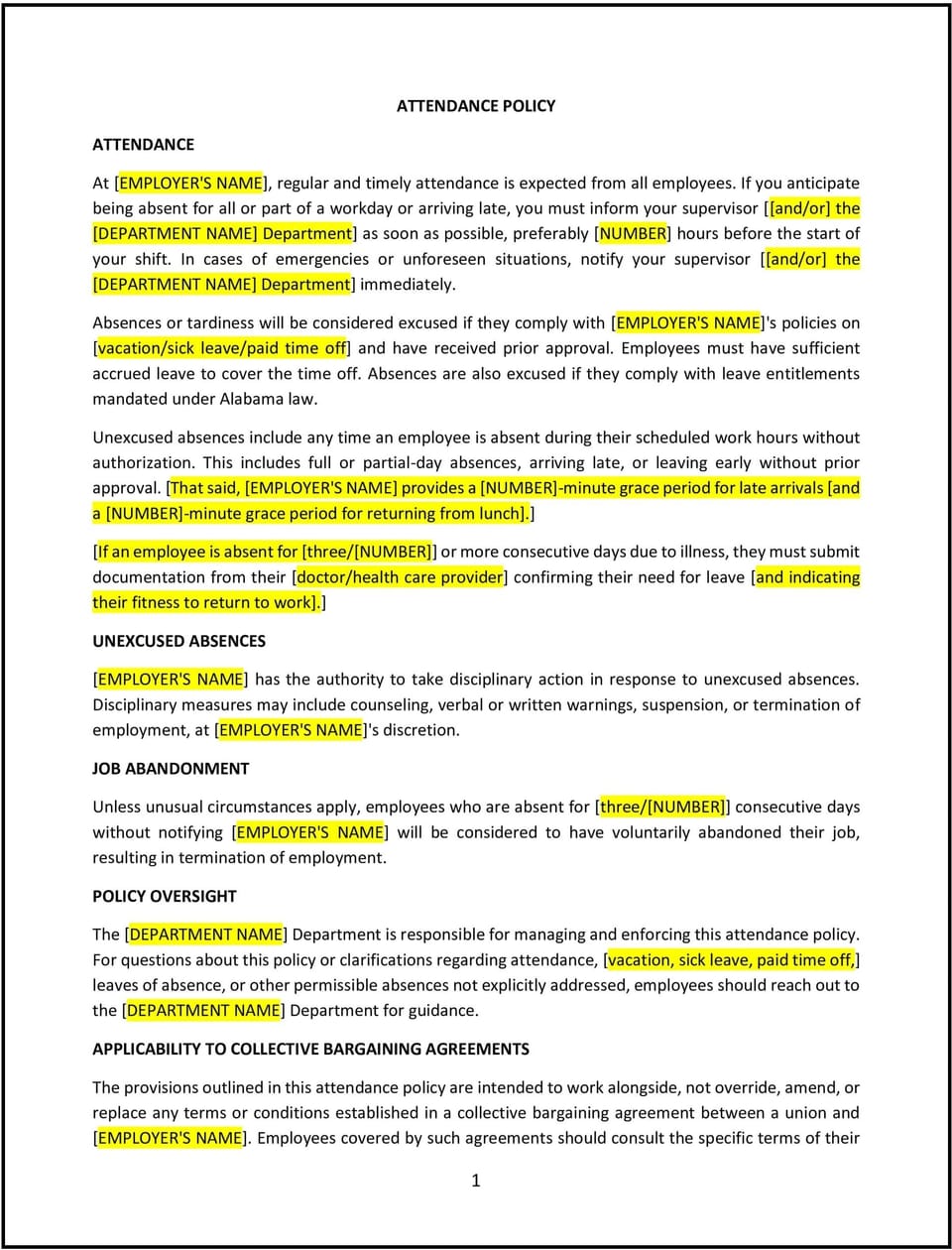Attendance policy (Alabama): Free template

Attendance policy (Alabama)
An attendance policy is critical for ensuring consistency, accountability, and fairness in managing employee schedules and time off. In Alabama, this policy helps businesses establish clear expectations for punctuality and attendance while addressing state-specific considerations like compliance with Alabama labor laws and employee leave requirements. Customizing this policy to your workplace ensures clarity and alignment with organizational goals and legal standards.
How to use this attendance policy (Alabama)
- Set clear expectations: Define attendance standards, including work hours, tardiness, and absenteeism policies, tailored to your Alabama-based workforce.
- Incorporate state-specific leave laws: Ensure the policy accounts for Alabama regulations on unpaid leave and any applicable federal laws like the FMLA.
- Establish reporting procedures: Outline how employees should report absences or request leave, including notice periods and acceptable documentation.
- Communicate consistently: Share the policy with employees during onboarding and provide periodic reminders through staff meetings or emails.
- Monitor and enforce: Track attendance consistently and apply the policy fairly to all employees to promote trust and accountability.
Benefits of using an attendance policy (Alabama)
A well-structured attendance policy supports operational efficiency and fairness. Here's how it helps:
- Improves reliability: Encourages employees to meet attendance standards, enhancing workplace productivity.
- Promotes fairness: Ensures all employees are held to the same expectations, minimizing disputes.
- Reduces absenteeism: Provides clear procedures for managing and addressing frequent absences.
- Supports compliance: Aligns with Alabama and federal regulations, reducing legal risks.
- Enhances communication: Clearly outlines processes for reporting absences, reducing confusion and miscommunication.
Tips for using an attendance policy (Alabama)
- Include grace periods: Allow reasonable flexibility for tardiness due to common challenges like Alabama’s weather conditions or commuting delays.
- Address absenteeism proactively: Provide resources like counseling or schedule adjustments for employees struggling with attendance.
- Tailor to your industry: Reflect specific needs of industries prevalent in Alabama, such as manufacturing or healthcare, where shift work may require unique rules.
- Ensure legal compliance: Review the policy for alignment with Alabama wage and hour laws and federal leave regulations.
- Reinforce through training: Include attendance expectations in employee training programs to ensure understanding and adherence.
Q: What should an attendance policy include?
A: It should outline work hours, tardiness rules, absenteeism procedures, and reporting requirements tailored to your company and Alabama’s legal context.
Q: Are Alabama employers required to provide paid sick leave?
A: Alabama does not mandate paid sick leave, but federal laws like the FMLA may apply to qualifying employers.
Q: How should employees report absences?
A: Employees should report absences through designated channels, such as notifying their supervisor or HR via email or phone.
Q: What happens if an employee violates the attendance policy?
A: Violations may result in disciplinary actions, ranging from warnings to termination, depending on the severity and frequency.
Q: How often should an attendance policy be reviewed?
A: Review the policy annually or whenever there are updates to Alabama labor laws or internal company practices.
This article contains general legal information and does not contain legal advice. Cobrief is not a law firm or a substitute for an attorney or law firm. The law is complex and changes often. For legal advice, please ask a lawyer.


